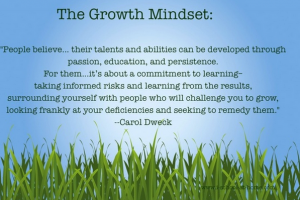I have recently been reading Carol Dweck’s Mindset- The New Psychology of Success as professional development. I began reading the book to access the knowledge and strategies I needed to support my students. I had begun to notice that some of my students were really uncomfortable with challenging work that asked a lot of them. Even more uncomfortable with failing. Terribly uncomfortable with feedback that wasn’t glowing and demanded a second look, more detail or a complete overhaul. Just really uncomfortable with being uncomfortable. When work was easy, all was well in the world. When the test or assignment came back with accolades and the desired grade, all was even better in the world. But what happens when it’s not glowing? What about when the positive may be overshadowed by a lot of “where to go next to improve”? What do you do then? Therein lies the difference between those with a fixed mind-set versus a growth mind-set. Some were eager for feedback as a chance to become better at a skill. Others relished a chance to “attempt a challenge”. I also came to see others did not accept challenge as a chance to flex their mind. The work was just too hard. They dropped the course. They didn’t read the feedback. Or worse, feedback was terribly personal that they assumed “a teacher hated them” or that they just didn’t get the material. AND NEVER WOULD. Enter the fixed mind set. You were either good at X or not.
With each page I read, with each Youtube clip I watched, and with each growth mind-set infographic I agonized over, I was working to find a way to encourage my own students to be more comfortable with failure. I want my students to embrace challenges and resist the temptation to quit when things become hard, uncomfortable or confusing. I want my students to hear feedback as critical but helpful and not criticism. I want my students to be up for any challenge. I am going to help them get there! I am going to help them develop a growth mind-set. It will make them better students, better future employees, better partners…BETTER HUMAN BEINGS. (Lofty goal, aren’t they?)
But as I read through the book…a quiet voice started getting a little louder. For all I asked of my students, I wasn’t so sure I was asking that of myself. Am I up for the challenge? Do I attempt work that is really challenging and jump in ready to learn? Can a colleague offer feedback about my teaching? My interactions with students? My marking practices? And can I take that and learn from it? Do I take feedback as a path to empowerment or terribly personal?
Ultimately, asking myself one question: Do I have a fixed or growth mindset?
How can I ask of my students what I don’t foster in myself?
As I move forward in my growth as a teacher, I need to persist in the face of difficulty or setbacks. I need to accept challenges that may not be easy. I need to hear and grow from feedback. I need a growth mindset.
My journey begins this year. Anyone else with me?
Danielle

I’m in, and have been all along! I know you already know this, but it bears repeating: the growth mindset is vital to student learning. However, what you’ve touched on in your post is not only Growth Mindset, but also Grit: the ability to commit to learning over a long period of time despite obstacles, set-backs and challenges. These two ideas work so powerfully when paired that I had my teachers take Angela Lee Duckworth’s Grit Inventory at the beginning of the year…guess what we’re doing in Jan., and at the end of the year. Also, in a recent staff meeting I opened with “I want you to shift your mindset to the one that you want your students to have when about to teach a difficult subject…” Powerful!
I know there’s been a lot of blowback on the concept of “Grit” (Alfie Khon’s article articulates this well), but I don’t want to throw it out. I’d rather see it paired with Dweck’s theory. To put it bluntly, “If you’re not good at the trombone, try another instrument because you can learn to play music – just don’t give up on music altogether!”
Thanks Danielle for this thoughtful post, putting yourself out there, and challenging us to do the same. Maybe we should all take the Grit inventory in Cohort 21…what do you think?
Oh Alfie Kohn…while I love him, I do question the value of just arguing and disagreeing with everything that seems to be getting some traction or has people talking in the world of education. Sometimes I just think Kohn rides on the coattails of a hot topic just by offering a contrary perspective…even though his ideas are often interesting. Just my contrary view on contrarians!
I’m in too!
Danielle,
Yes! This has been the guiding question behind all of my work in Grade 7 English this year. My thought is that if I can, above everything else, instil a growth mindset in my students, everything else they do academically will be better and more powerful because they will know how to learn and achieve success.
I’m currently trying to experiment with using portfolios as a way to document this growth and learning across the subject areas.
Also, check out this resource…the one of the best ones I’ve found for getting the message across to a student audience: http://www.thestraightaconspiracy.com/